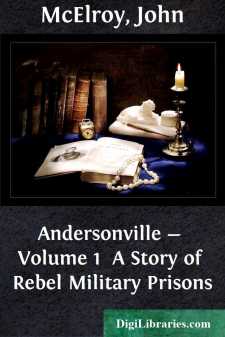Categories
- Antiques & Collectibles 13
- Architecture 36
- Art 48
- Bibles 22
- Biography & Autobiography 815
- Body, Mind & Spirit 144
- Business & Economics 28
- Children's Books 18
- Children's Fiction 14
- Computers 4
- Cooking 94
- Crafts & Hobbies 4
- Drama 346
- Education 58
- Family & Relationships 59
- Fiction 11833
- Games 19
- Gardening 17
- Health & Fitness 34
- History 1378
- House & Home 1
- Humor 147
- Juvenile Fiction 1873
- Juvenile Nonfiction 202
- Language Arts & Disciplines 89
- Law 16
- Literary Collections 686
- Literary Criticism 179
- Mathematics 13
- Medical 41
- Music 40
- Nature 179
- Non-Classifiable 1768
- Performing Arts 7
- Periodicals 1453
- Philosophy 65
- Photography 2
- Poetry 896
- Political Science 203
- Psychology 44
- Reference 154
- Religion 515
- Science 126
- Self-Help 85
- Social Science 82
- Sports & Recreation 34
- Study Aids 3
- Technology & Engineering 59
- Transportation 23
- Travel 463
- True Crime 29
John McElroy
John McElroy (1846-1929) was an American writer and journalist best known for his Civil War memoir, "Andersonville: A Story of Rebel Military Prisons," published in 1879. His book provided a harrowing and influential account of the brutal conditions faced by Union soldiers held at Andersonville prison in Georgia. McElroy's writings not only chronicled his own experiences as a prisoner of war but also shed light on the larger issues of captivity and survival during the Civil War.
Author's Books:
Sort by:
by:
John McElroy
INTRODUCTION. The fifth part of a century almost has sped with the flight of time since the outbreak of the Slaveholder's Rebellion against the United States. The young men of to-day were then babes in their cradles, or, if more than that, too young to be appalled by the terror of the times. Those now graduating from our schools of learning to be teachers of youth and leaders of public thought, if...
more...
by:
John McElroy
The fifth part of a century almost has sped with the flight of time since the outbreak of the Slaveholder's Rebellion against the United States. The young men of to-day were then babes in their cradles, or, if more than that, too young to be appalled by the terror of the times. Those now graduating from our schools of learning to be teachers of youth and leaders of public thought, if they are ever...
more...
by:
John McElroy
The rations diminished perceptibly day by day. When we first entered we each received something over a quart of tolerably good meal, a sweet potato, a piece of meat about the size of one's two fingers, and occasionally a spoonful of salt. First the salt disappeared. Then the sweet potato took unto itself wings and flew away, never to return. An attempt was ostensibly made to issue us cow-peas...
more...
by:
John McElroy
CLOTHING: ITS RAPID DETERIORATION, AND DEVICES TO REPLENISH IT—DESPERATE EFFORTS TO COVER NAKEDNESS—"LITTLE RED CAP" AND HIS LETTER. Clothing had now become an object of real solicitude to us older prisoners. The veterans of our crowd—the surviving remnant of those captured at Gettysburg—had been prisoners over a year. The next in seniority—the Chickamauga boys—had been in ten...
more...
by:
John McElroy
THE REBELS FORMALLY PROPOSE TO US TO DESERT TO THEM—CONTUMELIOUS TREATMENT OF THE PROPOSITION—THEIR RAGE—AN EXCITING TIME—AN OUTBREAK THREATENED—DIFFICULTIES ATTENDING DESERTION TO THE REBELS. One day in November, some little time after the occurrences narrated in the last chapter, orders came in to make out rolls of all those who were born outside of the United States, and whose terms of...
more...
by:
John McElroy
AND WHAT BECAME OF IT. AFTER Si Klegg had finally yielded to his cumulative patriotic impulses and enlisted in the 200th Ind. for three years or until the rebellion was put down, with greater earnestness and solemnity to equip himself for his new career. He was thrifty and provident, and believed in being ready for any emergency. His friends and family coincided with him. The Quartermaster provided him...
more...
by:
John McElroy
CHAPTER I. THROUGH MUD AND MIRE DUTY'S PATH LEADS THE 200TH IND. SOUTHWARD FROM NASHVILLE. "SHORTY" said Si Klegg, the morning after Christmas, 1862, as the 200th Ind. sullenly plunged along through the mud and rain, over the roads leading southward from Nashville, "they say that this is to be a sure-enough battle and end the war." "Your granny's night-cap they do,"...
more...
by:
John McElroy
CHAPTER I. OUT ON PICKET THE BOYS SHOW THE DEACON A NEW WRINKLE IN THE CULINARY ART. SOME days later, Si had charge of a picket-post on the Readyville Pike, near Cripple Deer Creek. The Deacon went with them, at their request, which accorded with his own inclinations, The weather was getting warmer every day, which made him fidgety to get back to his own fields, though Si insisted that they were still...
more...
by:
John McElroy
JUNE 23, 1863, ended the Army of the Cumberland's six months of wearisome inaction around Murfreesboro its half-year of tiresome fort-building, drilling, picketing and scouting. Then its 60,000 eager, impatient men swept forward in combinations of masterful strategy, and in a brief, wonderfully brilliant campaign of nine days of drenching rain drove Bragg out of his strong fortifications in the...
more...
by:
John McElroy
CHAPTER I. THE DEACON PROVIDES RESORTS TO HIGHWAY ROBBERY AND HORSE STEALING. THE Deacon was repaid seventyfold by Si's and Shorty's enjoyment of the stew he had prepared for them, and the extraordinary good it had seemed to do them as they lay wounded in the hospital at Chattanooga, to which place the Deacon had gone as soon as he learned that Si was hurt in the battle. "I won't go...
more...











